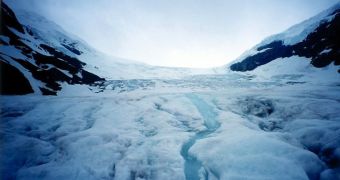The Arctic might be losing ice at a rapid pace but, as it turns out, the Athabasca glacier in the Canadian Rockies is not doing all that great either. In fact, word has it it will soon melt in its entirety.
Specialists with Parks Canada, who have been monitoring this block of ice for quite a while now, explain that, according to their calculations, the Athabasca glacier is losing about 16 feet (nearly 5 meters) of ice yearly.
Interestingly enough, this is happening despite the fact that, come winter, the Athabasca glacier receives approximately 23 feet (some 7 meters) of snow, Think Progress informs.
“What we’re finding is that, even with substantial snow years, the summers are warm enough and the fall is prolonged enough that all of that snow goes and we’re still losing five meters,” says specialist Bob Sandford.
“Every year we drive stakes five meters deep into the glacier in the fall. We have to return and re-drill them in mid-summer because a lot of those stakes on the Athabasca Glacier, the one that a lot of people go visit, will be lying flat on the ice at that time,” adds John Wilmshurst.
By the looks of it, this block of ice in the Canadian Rockies receded about 1 mile (1.6 kilometers) since 1890 until present day. Apart from this, the glacier is getting thinner, most likely because of the global warming diet it is on.
Researchers warn that, under a business-as-usual scenario, changes are that this glacier will melt in its entirety and vanish within just one generation, which is way sooner than anyone would expect.
News of the melting of this glacier in North America comes shortly after it has been announced that, according to recent figures, climate change and global warming are reshaping the Antarctic's ice coverage as well.
Thus, this region is said to be losing about 159 billion metric tonnes of ice per year in today's day and age. To put things into perspective, it need be said that, between 2005 and 2010, yearly ice loss in the Antarctic was documented to be one of just 100 billion metric tons.
Should this melting trend continue unabated – and, judging by how things are going, this might just happen – global sea levels stand to rise by about 0.45 millimeters each year. This might not sound like much but, on the long run, coastal communities will most certainly be able to tell the difference.

 14 DAY TRIAL //
14 DAY TRIAL //